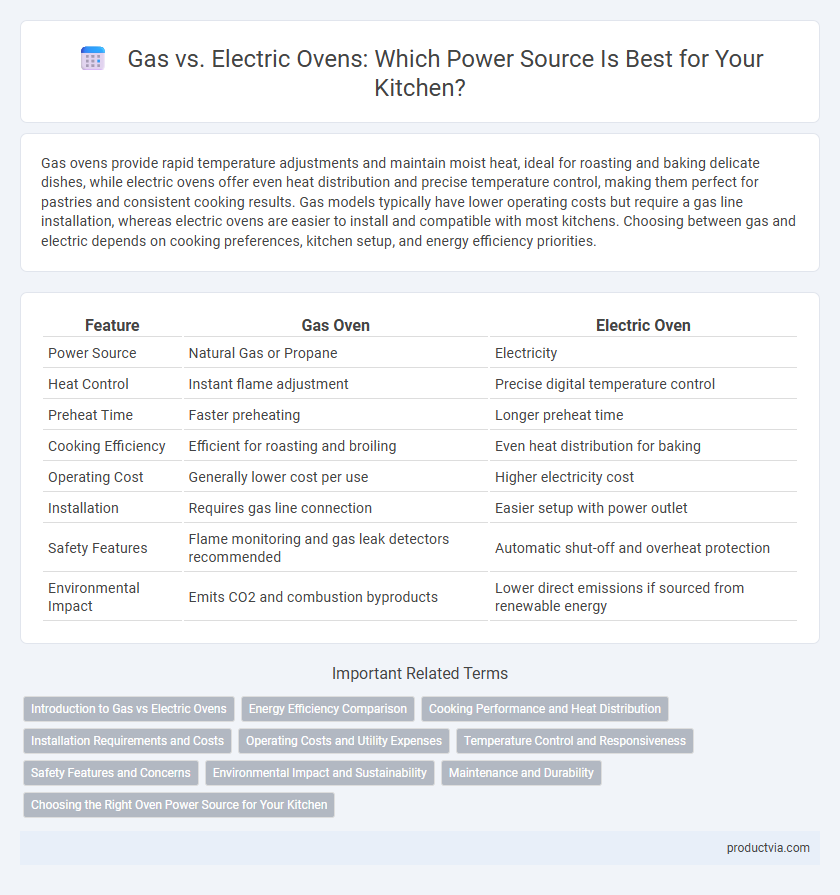Gas ovens provide rapid temperature adjustments and maintain moist heat, ideal for roasting and baking delicate dishes, while electric ovens offer even heat distribution and precise temperature control, making them perfect for pastries and consistent cooking results. Gas models typically have lower operating costs but require a gas line installation, whereas electric ovens are easier to install and compatible with most kitchens. Choosing between gas and electric depends on cooking preferences, kitchen setup, and energy efficiency priorities.
Table of Comparison
| Feature | Gas Oven | Electric Oven |
|---|---|---|
| Power Source | Natural Gas or Propane | Electricity |
| Heat Control | Instant flame adjustment | Precise digital temperature control |
| Preheat Time | Faster preheating | Longer preheat time |
| Cooking Efficiency | Efficient for roasting and broiling | Even heat distribution for baking |
| Operating Cost | Generally lower cost per use | Higher electricity cost |
| Installation | Requires gas line connection | Easier setup with power outlet |
| Safety Features | Flame monitoring and gas leak detectors recommended | Automatic shut-off and overheat protection |
| Environmental Impact | Emits CO2 and combustion byproducts | Lower direct emissions if sourced from renewable energy |
Introduction to Gas vs Electric Ovens
Gas ovens utilize natural gas or propane to generate heat, offering rapid temperature adjustments and often preferred by professional chefs for precise control. Electric ovens rely on electrical heating elements, providing even heat distribution and consistent baking results, favored in modern kitchens for energy efficiency. Choosing between gas and electric ovens depends on cooking style, energy availability, and installation considerations.
Energy Efficiency Comparison
Gas ovens typically consume less energy during preheating and cooking because they provide instant heat control and direct flame, leading to faster temperature adjustments. Electric ovens convert electricity into heat with high precision and consistent temperature maintenance, often resulting in more even cooking and reduced heat loss. Energy efficiency depends on factors like oven insulation, usage habits, and local energy costs, but gas ovens generally offer lower operational costs, while electric ovens excel in heat retention and temperature accuracy.
Cooking Performance and Heat Distribution
Gas ovens provide immediate heat and allow precise temperature control, making them ideal for tasks requiring quick temperature adjustments, while their open flame promotes uneven heat distribution compared to electric ovens. Electric ovens use heating elements that offer consistent and uniform heat, resulting in more even baking and roasting, which benefits delicate dishes needing stable temperatures. Cooking performance in gas ovens excels with high-heat searing and broiling, whereas electric ovens provide superior heat retention and steady cooking environments.
Installation Requirements and Costs
Gas ovens typically require professional installation to connect to an existing gas line, which can increase upfront costs and may involve permits for safety compliance. Electric ovens offer simpler installation, needing only a compatible electrical outlet, often reducing labor expenses and installation time. While gas ovens tend to have higher initial setup costs due to gas line work, electric ovens may save money on installation but can lead to higher utility bills depending on electricity rates.
Operating Costs and Utility Expenses
Gas ovens generally offer lower operating costs compared to electric ovens due to natural gas prices typically being cheaper than electricity rates per unit of energy. Utility expenses for gas ovens can be more predictable and cost-effective, especially in regions where natural gas infrastructure is well-established. However, electric ovens provide more consistent heat control, which may influence energy efficiency and overall utility bills depending on usage patterns.
Temperature Control and Responsiveness
Gas ovens provide instant heat adjustments with precise flame control, allowing for rapid temperature changes ideal for recipes requiring quick responsiveness. Electric ovens maintain consistent, even temperatures due to their heating elements, offering superior temperature stability for slow cooking and baking. Choosing between gas and electric ovens hinges on whether quick temperature changes or stable heat control is prioritized in cooking tasks.
Safety Features and Concerns
Gas ovens offer intuitive flame-based ignition systems but carry risks of gas leaks and carbon monoxide exposure, necessitating proper ventilation and regular maintenance. Electric ovens provide consistent temperature control and eliminate combustion byproducts, significantly reducing fire and poisoning hazards. Safety features such as automatic shut-off and temperature sensors are more advanced in electric ovens, enhancing user protection compared to gas-powered models.
Environmental Impact and Sustainability
Gas ovens emit carbon dioxide and methane during combustion, contributing directly to greenhouse gas emissions and indoor air pollution. Electric ovens, when powered by renewable energy sources such as solar or wind, offer a cleaner alternative with significantly lower carbon footprints. Life cycle assessments show that electric ovens paired with a green energy grid support greater environmental sustainability compared to fossil-fuel-dependent gas ovens.
Maintenance and Durability
Gas ovens typically require more frequent maintenance due to burner cleaning and pilot light adjustments, but their metal components often offer robust durability. Electric ovens have fewer mechanical parts, reducing maintenance needs, and their heating elements usually last longer, enhancing overall durability. Choosing between gas and electric ovens depends on prioritizing ease of maintenance or longevity of heating elements in daily use.
Choosing the Right Oven Power Source for Your Kitchen
Gas ovens provide instant heat control and typically use less energy, making them ideal for those who prioritize precise cooking and cost efficiency. Electric ovens offer even heat distribution and higher maximum temperatures, which benefit baking and roasting performance with consistent results. When choosing the right oven power source, consider your cooking preferences, kitchen setup, and energy costs to ensure optimal performance and convenience.
Gas vs Electric for Oven Power Source Infographic

 productvia.com
productvia.com